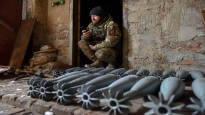The European Union’s foreign and defense ministers are meeting in Brussels in a situation where the goal of delivering a million munitions to Ukraine looks increasingly unlikely.
The EU’s ammunition deliveries to Ukraine are lagging behind to such an extent that the delivery of a million heavy artillery shells to Ukraine by next spring seems very unlikely. The goal was originally launched at the initiative of Estonia.
According to STT’s data, only about 300,000 ammunition have been delivered to Ukraine from the warehouses of the EU member states. There are more than 155 millimeter heavy artillery shells in the group.
In the past, there have been uncertainties associated with the figures regarding ammunition deliveries. During the meeting of foreign ministers in May, only about 60,000 munitions were delivered, but after the meeting, the high representative of the EU Josep Borrell reports to the public about up to 220,000 delivered ammunition.
Also this time, statistical data from different member countries was still collected last week, so some kind of updates to the figures may appear. However, the measurement category indicates that it is probably impossible to achieve the goal within the target time.
Deliveries from the member countries’ own warehouses are the fastest way to get ammunition to Ukraine, but at the same time, the member countries are forced to maintain their own defense capabilities. Therefore, warehouse deliveries have their limits before they are filled.
Increasing the capacity of the defense industry has also proven to be a slow project for several reasons. Among them have been the lack of raw materials and ESG requirements related to responsibility, which have made it difficult for defense industry companies to get bank loans.
Supporting Ukraine is one of the issues that defense ministers will have to think about when they meet on Tuesday in Brussels. Finland is represented by the Minister of Defense Antti Häkkänen (collect.).
The Middle East is the concern of foreign ministers
The two-day start to the EU’s foreign and security policy begins on Monday with a meeting of foreign ministers. What they will discuss is long-term support for Ukraine and the country’s membership prospects.
In addition, the foreign ministers are also worried about the situation in the Middle East, which Brussels now fears will take too much attention away from supporting Ukraine.
On top of that, the EU has been sticky with its policy in the Middle East, because in reality, for example, the different member states are far from each other in their views on the conflict between Israel and Hamas. Some place more emphasis on the importance of humanitarian aid and others on Israel’s right to defend itself.
Finland will be represented on Monday by the foreign minister Elina Valtonen (collect.).
